Related Research Articles
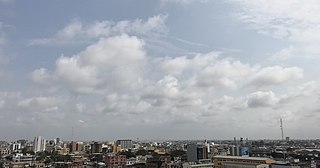
Cotonou is a city in Benin. Its official population count was 679,012 inhabitants in 2012; however, over two million people live in the larger urban area.

Béhanzin is considered the eleventh King of Dahomey, modern-day Republic of Benin. Upon taking the throne, he changed his name from Kondo.
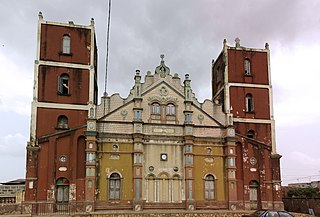
Ouémé is one of the twelve departments of Benin, containing the capital of the country Porto Novo. It is subdivided into nine communes, each centred at one of the principal towns: Adjarra, Adjohoun, Aguégués, Akpro-Missérété, Avrankou, Bonou, Dangbo, Porto-Novo and Sèmè-Kpodji. In 1999, the northern section of Ouémé was split off to form the department of Plateau.
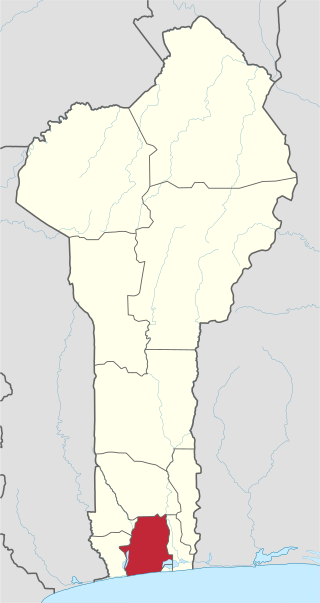
Atlantique is one of the twelve departments in Benin. The department is located in south-central Benin along the Atlantic coast, between Mono and Kouffo Department in the west, Zou in the north, and Ouémé in the east. The department of Atlantique was bifurcated in 1999 when some of its territories was transferred to the newly formed Littoral Department.

The departments of Benin are subdivided into 77 communes, which in turn are divided into arrondissements and finally into villages or city districts. Prior to 1999 provinces were broken down into 84 districts, titled either urban or rural. Before independence, the six provinces were subdivided into Cercles, cantons, préfectures and villages or towns.

The First Franco-Dahomean War was fought in 1890 between France, led by General Alfred-Amédée Dodds, and Dahomey under King Béhanzin.
The Benin Premier League, also called Championnat National du Bénin in French, is the highest football division in Benin. The league was held in 1969 for the first time. Currently, the initial round is a double round-robin tournament, with 36 clubs being divided in 4 groups, and 9 clubs in each. The last 5 teams of each group, goes to the relegation round, which consists on 2 groups of 10 teams. The first 4 teams of each group goes to the final stage with 16 clubs playing a single round-robin tournament. The winner of this round earns a place in the CAF Champions League.
The Benin Cup is the top knockout tournament of the Beninese football. It was created in 1974.

The following outline is provided as an overview of and topical guide to Benin:

Religion in Benin is characterized by diversity and pluralism, with no particular religion constituting an absolute majority of the population. Christianity is the most widely professed religion, and substantial populations of Muslims and adherents of Traditional Faiths are also present in the country. According to the most recent 2013 census, the population of Benin is 27.7% Muslim, 25.5% Roman Catholic, 13.5% Protestant, 11.6% Vodun, 9.5% of other Christian denominations, and 12.2% of others or none.
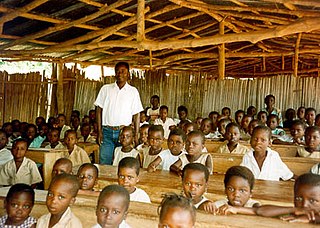
Benin has abolished school fees and is carrying out the recommendations of its 2007 Educational Forum. In 2018, the net primary enrollment rate was 97 percent. Gross enrollment rate in secondary education has greatly increased in the last two decades, from 21.8 percent in 2000 to 59 percent in 2016, 67.1 percent in the case of males and 50.7 percent for females. Because of a rapid increase in the enrollment rate, the student/teacher ratio rose from 36:1 in 1990 to 53:1 in 1997 but has dropped again in the last years to 39:1 (2018). In 2018, the gross enrollment ratio in tertiary education was 12.5%.

Gun is a language in the Gbe languages group. It is spoken by the Ogu people in Benin, as well as in south-western Nigeria. Gun is part of the Fon cluster of languages inside the Eastern Gbe languages; it is close to Fon, especially its Agbome and Kpase varieties, as well as to the Maxi and Weme (Ouémé) languages. It is used in some schools in the Ouémé Department of Benin.
Aguégués is a town and commune in the Ouémé Department of south-eastern Benin. The commune covers an area of 52 square kilometres and as of 2002 had a population of 26,650 people.

Benin has a total of 578 km (359 mi) of single track, 1,000 mm railway. Rail construction began around 1900, with regular services commencing in 1906; rail operation was taken into government control in 1930.
Benin, officially the Republic of Benin, is a country in Western Africa. It borders Togo to the west, Nigeria to the east and Burkina Faso and Niger to the north; its short coastline to the south leads to the Bight of Benin. Its size is just over 110000 km2 with a population of almost 8500000. Its capital is the Yoruba founded city of Porto Novo, but the seat of government is the Fon city of Cotonou. About half the population live below the international poverty line of US$1.25 per day.
The 2016 Benin Premier League started on 2 March 2016.
The 2018–19 Benin Premier League is the 41st season of the Benin Premier League, the top-tier football league in Benin. The season started on 27 October 2018.
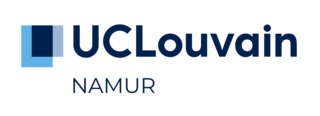
The CHU UCLouvain Namur or CHU UCL Namur is a university hospital located in the cities of Namur, Dinant, Yvoir and Ciney, in the Belgian province of Namur. Established in 2015, it is UCLouvain's second hospital.
References
- ↑ Elahi, Ebby, ed. (2021). Insights in Global Health, A Compendium of Healthcare Facilities and Nonprofit Organizations. Baca Raton, Florida: CRC Press. ISBN 9780367693466.
- 1 2 3 4 5 6 7 8 9 10 11 "A spatial database of health facilities managed by the public health sector in sub-Saharan Africa". World Health Organization. February 11, 2019. Archived from the original on April 22, 2019. Retrieved May 8, 2020.
- ↑ European Commission (1987). Courier, Africa Caribbean Pacific European Community. Commission of the European Communities. Retrieved 27 November 2011.
- ↑ "Clinique du Golfe". Clinic of Golfe. Retrieved January 10, 2021.
- ↑ Kraus, Erika; Reid, Felicie (26 January 2010). Benin (Other Places Travel Guide). Other Places Publishing. p. 74. ISBN 978-0-9822619-1-0 . Retrieved 27 November 2011.
- ↑ Rangayyan, Rangaraj M. (1990). IEEE Western Canada Conference and Exhibition on Telecommunication for Health Care--Telemetry, Teleradiology, and Telemedicine: proceedings, IEEE WESCANEX '90 : July 6-7, 1990, the University of Calgary, Calgary, Alberta, Canada. IEEE Engineering in Medicine and Biology Society, SPIE--the International Society for Optical Engineering. ISBN 978-0-8194-0416-9 . Retrieved 27 November 2011.
- ↑ "Hospital Ahmadiyya Parakou"., Archived 2015-04-16 at archive.today
- ↑ Sargent, Carolyn Fishel (1989). Maternity, medicine, and power: reproductive decisions in urban Benin. University of California Press. p. 48. ISBN 978-0-520-06484-3 . Retrieved 27 November 2011.
- ↑ "Hopital Amadiyya Porto Novo". Ahmadiyya Benin., Archived 2015-04-16 at archive.today
- ↑ Commission of the European Communities (1988). The Courier: Africa-Caribbean-Pacific-European Union. Commission of the European Communities. p. x. Retrieved 27 November 2011.